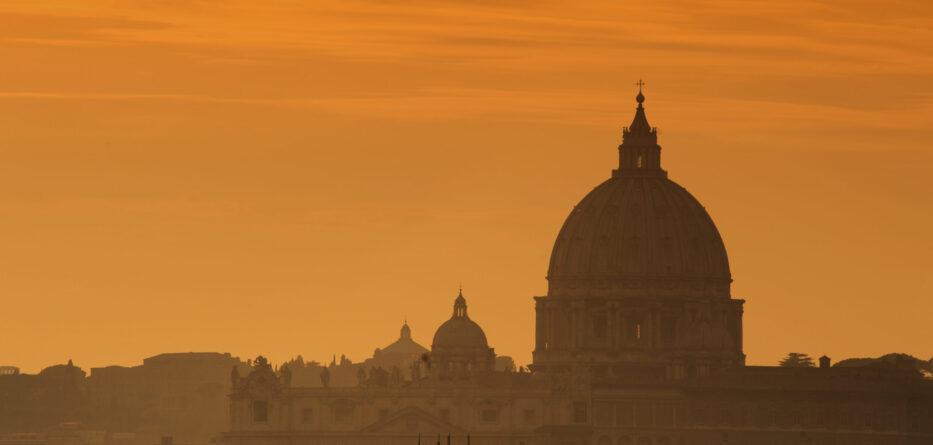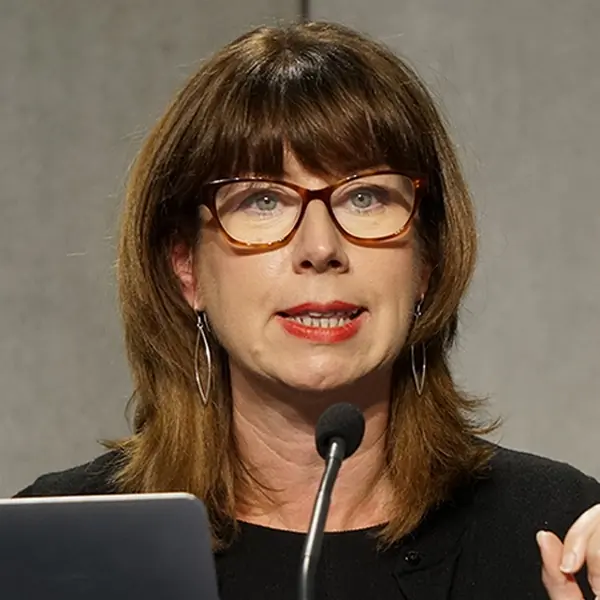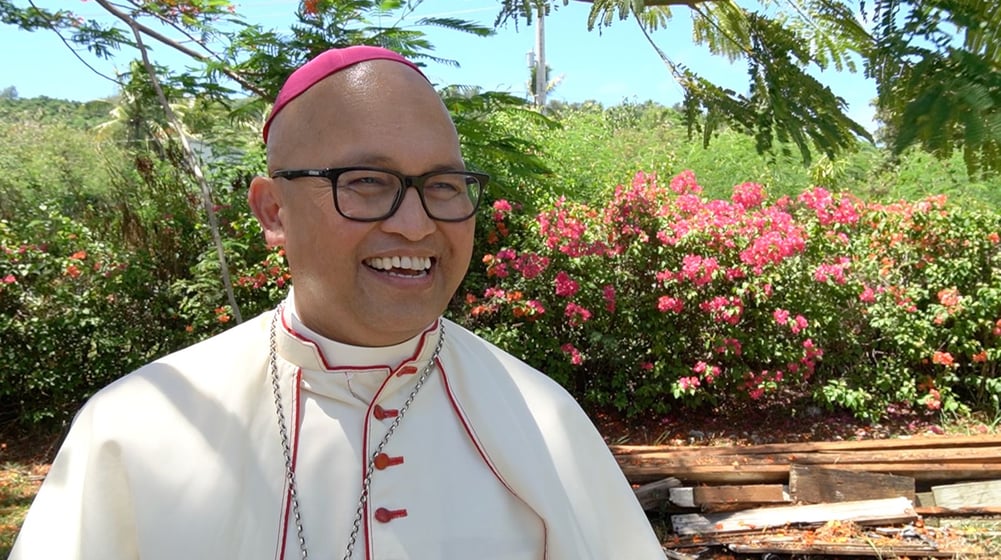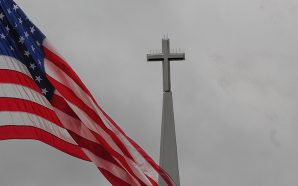Throughout October 2024, Br Mark O’Connor FMS, Vicar for Communications for the Diocese of Parramatta and the Pope Francis Fellow at Newman College, University of Melbourne, will provide reports on the second session of the Synod on Synodality in Rome.
This is his third letter for Tuesday, October 15th.
“We must be ready to allow ourselves to be interrupted by God. God will be constantly crossing our paths and cancelling our plans by sending us people with claims and petitions.”
Dietrich Bonhoeffer, Life Together
Mood swings are not uncommon for many of us. They can interrupt our usual ways of coping with reality. Usually, we simply take a break or have a drink (!) or in extreme cases seek professional help. Rome’s weather has also been rather moody in the last week or so. We have been constantly interrupted, oscillating between wild storms, cloudy days, and the usual sunny autumn weather.
The martyred Lutheran, Dietrich Bonhoeffer particularly understood that the action of the Spirit can be unpredictable and unsettle us. Indeed, the history of the pilgrim people of God (aka the holy, apostolic Roman Catholic church) and our own personal journeys, are full of surprises, twists and turns, mood swings, and a few major interruptions!
Pope John XXIII ‘interrupted’ what appeared to be a calm, comfortable, and stable church, and ‘opened up the windows’ by calling the Second Vatican Council and the Spirit moved amongst us.
His successor Popes, over the last sixty years, have each led, ‘interrupted’ the church, and implemented Vatican II, in their own unique way.
Synodality: The “gift” of Pope Francis
For the last decade, Pope Francis has interrupted and energised the church with his own pastoral vision, born of the Latin American church’s rich history of renewal. He has given us all new impetus to the reception of that great Council.
Francis has especially emphasised the Gospel themes of mercy, compassion, and the accompaniment of the people of God. He is sensitive to ordinary people as they struggle to connect their faith to the cultures in which they live.
I believe one of the great lasting gifts of Francis for the future of the Church, is his insistence that the mission path ahead (call it evangelisation if you want to use a fancy word) must first begin by humbly listening, then prayerfully discerning, and only then living our way into new forms of pastoral action.
Hence, Pope Francis prioritises synodality as the map or methodology for our future church journey. He wants this to be a major legacy of his pontificate.
Francis sums it up by stressing: “My hope is that following this Synod, synodality may endure as a permanent mode of working within the Church, at all levels, becomes a shared ecclesial style.”
As the delegates have met daily in small groups this last fortnight, listening to each other in ‘conversations of the Spirit’, the general mood is that this ecclesial path of dialogue and encounter is indeed deepening in the global Catholic Church.
The delegates have been blessed by having been masterfully led in profound meditations from Timothy Radcliffe OP.
In addition to the small group process, the delegates and the whole of the people of God’s attention, have also been drawn in to focus on some key themes of the Petrine ministry of Pope Francis: peacemaking, ecumenism and through open public forums on topics such as, ‘The People of God as the protagonist of mission‘ and ‘Bishops ‘called to be ‘brothers and friends’‘.
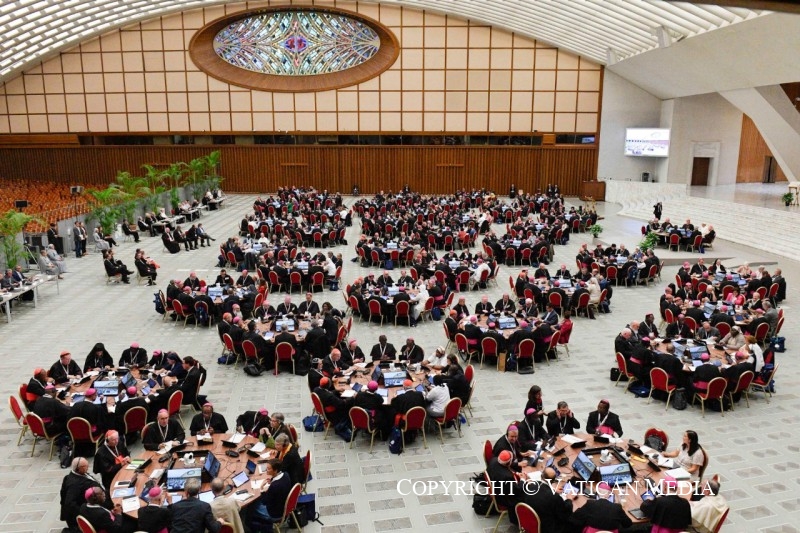
Participants attend a Session of the 16th General Assembly of the Synod of Bishops at the Vatican, 7 October 2024. Image: Vatican News
Voices from the Synod
Although the conversations inside the Synod Hall are confidential (understandable and even necessary), it does make it harder for those of us not inside the Synod Hall to get a sense of what is really happening. You can read this interesting summary of proceedings for more context.
Anecdotally, one does hear many good things are happening and patience and trust is asked for
1-minute video of #Synod2024 ️ Monday, October 14#synod2024 #sínodo2024 #sinodo2024 #sínodo2024 #synode2024#synodality #sinodalidad #sinodalità #sinodalidade #synodalité pic.twitter.com/0rq3JrLPtK
— Synod.va (@Synod_va) October 14, 2024
Imperfect as it is, therefore, I can only recommend – as a way of experiencing something of what is happening inside the Synod Hall – that the reader listen to the following sample voices:
Cardinal Joseph Tobin of Newark, N.J. USA
And I also highly recommend listening to the following podcasts of Geraldine Doogue’s podcast series Plenary Matters.
Two interviews stand out for me, so far:
- One of the most influential lay women at the Synod is Professor Anna Rowlands, who believes a relational revolution is underway inside the Synod Hall. Working in the Synod Office for the past two years on secondment from Durham University, she sees the building of a relational fabric – including relations between women and men – as the basis of being a global synodal church.
2. What does synodal leadership mean for a bishop? Archbishop Ryan Jimenez is wrestling precisely with that question after being appointed as the new archbishop of Agaña, Guam, amid a crisis of sexual abuse in his diocese. He’s new to the synod – his appointment came after the first assembly last year – but he’s using this month in Rome for deep reflection on his role in what he believes is the ‘era of the laity.’ As president of the Episcopal Conference of the Pacific (CEPAC) he also brings lived experience of Pope Francis’ peripheries – in the region and in his own migrant story – to the synod table.
Conclusion
Talking of ‘mood swings’ and ‘interruptions’ there are also quite a few voices here in Rome somewhat ambivalent about this second session of the Synod. They legitimately raise some questions about the direction and purpose of this second session of the Synod, even if they are enthusiastic overall about the vision of Francis, our Pope.
Ricardo da Silva SJ goes so far as to say:
“Yet as time has gone on, I have grown more despondent about the seeming lack of common direction or clarity about the essential themes that need to be discussed among synod members. I have become less hopeful and increasingly frustrated with a process that seems to grow ever more complicated in its methodology, leaving delegates exhausted after long days with little time to reflect.”
That’s not exactly what I am hearing from my own informal conversations with delegates and Synod Facilitators (although their days and evening are clearly very long!)
But I do very much agree with Ricardo da Silva SJ when he comments insightfully that “I believe we have run up against the limit of talking about synodality in an abstract way.”
Tom Reese, SJ voiced a similar concern ahead of this year’s session, writing:
“Talking only about synodality can lead to a level of theological abstraction that goes nowhere. The most effective way to learn synodality is to do it on concrete issues facing the church. Rather than discussing musicology, we need to be an orchestra playing a symphony with actual instruments.”
There will be eventually a final Synod document and maybe even a post synodal exhortation from Pope Francis. But in my opinion, the real test, of course, will be if local bishops and their dioceses implement synodality in all their diocesan decision-making bodies at every level. For us Australians, that means leadership from our local bishops remains critical.
And it will be interesting to see if the next topic for a universal synod is actually conducted in a synodal way, as recommended by Pope Francis.
In any case, whatever happens there are sure to be further ‘interruptions’ of the Spirit!
However, let’s resist the temptation to ‘plan’ our future in any Pelagian way. We are a people of faith who trust that God will not abandon us.
So yes, I didn’t envisage the second session of the Synod to be so low-key, and immediate spectacular results aren’t likely.
But let’s take heart from the wisdom of USA poet and philosopher Wendell Berry:
It may be that when we no longer know what to do we have come to our real work,
and that when we no longer know which way to go we have come to our real journey.
The mind that is not baffled is not employed. The impeded stream is the one that sings.




